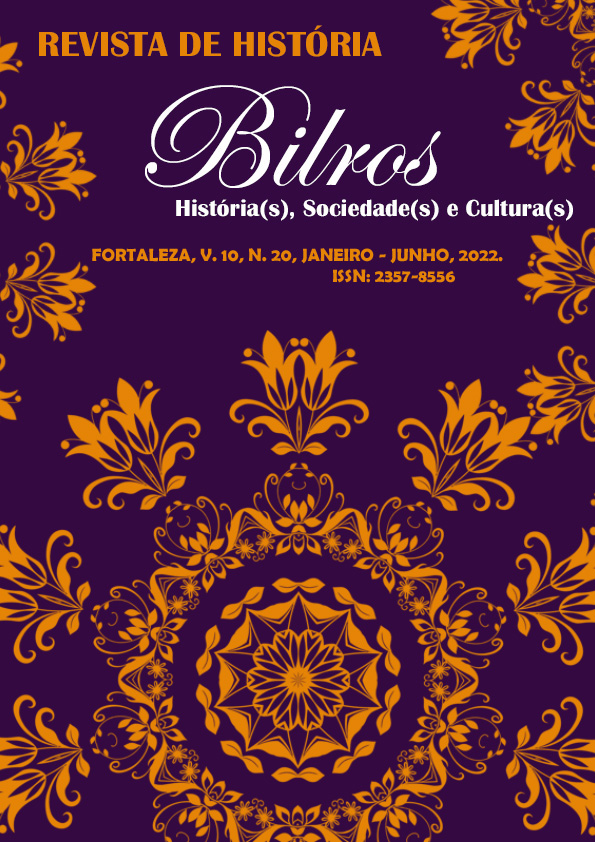HISTORY OF MINING IN BRAZILIAN TERRITORY:
AN ANALYSIS OF POLITICAL TREATIES THAT LEGISLATE MINING ACTIVITY (1934-1967)
Keywords:
Mining, Mining code, Exploration, Environmental CrisisAbstract
Minerals in Brazilian territory have been exploited by political treaties since the colonial period, and during the republication period, politicians created codes to regulate this sector, aligning with state interests, they are the Mining Codes of 1934, 1940 and 1967. The main objective of this research is to understand the relationship between the State and the mining sector, systematically analyzing the legal requirements that regulate mining in the territory of Brazil in its most recent history - Mining Codes, from these three great political treaties that regulate this sector, we seek to understand how the State has historically related to mining companies and to understand how the natural environment is considered by these treaties. This research also strives to investigate the relationship of political contexts in the time frame analyzed with the booms of growth in the mining area. For this, bibliographic readings are carried out in the theoretical area of Environmental History, and also to understand the experiences of the mining sector in different historical contexts.
References
ARÁOZ, Machado Horacio. Mineração, genealogia do desastre: O extrativismo na América como origem da modernidade. Trad.: João Peres. São Paulo: Elefante, 2020.
BENEVIDES, Maria V. O governo Kubitschek: a esperança como fator de desenvolvimento. In: GOMES, Angela de Castro. O Brasil de JK. 1. ed. Rio de Janeiro: Fundação Getúlio Vargas, 1991.
CHAKRABARTY, Dipesh. O clima da História: quatro teses. Sopro 91: Panfleto Político-Cultural, Trad. Denise Bottmann et all, p. 2-22, julho/2013.
CHARBONNIER, Pierre. Abundância e Liberdade: uma história ambiental das ideias políticas. Trad. Fabio Mascaro Querido. São Paulo: Boitempo, 2021.
BRANCO. Samuel Murgel. Energia e Meio Ambiente. São Paulo: Moderna, 1990.
BRASIL. Decreto Federal n. 1.985, de 29 de março de 1940. Normas políticas e jurídicas para o setor de mineração.
BRASIL. Decreto Federal n. 227, de 28 de fevereiro de 1967. Normas políticas e jurídicas para o setor da mineração.
BRASIL. Decreto Federal n. 24.642, de 10 de julho de 1934. Normas políticas e jurídicas para o setor de mineração.
DEAN, Warren. A industrialização de São Paulo (1880-1945). 2ª Edição, São Paulo: Difel, 1971.
EAGLETON, Terry. Versões de cultura. In. ___. A ideia de cultura. Trad. Sandra Castello Branco. 2. Ed. São Paulo: Unesp, 2005. p. 9-50.
FARO, Clóvis de; SILVA, Salomão L. A década de 50 e o Programa de Metas. In: GOMES, Angela de Castro. O Brasil de JK. 1. ed. Rio de Janeiro: Fundação Getúlio Vargas, 1991.
FIGUEIRÔA, Silvia. As ciências geológicas no Brasil: Uma história social e institucional, 1875-1934.São Paulo: HUCITEC, 1997.
FONSECA, Pedro C. D. Do progresso ao desenvolvimento no Brasil. In: BASTOS, Pedro P. Z.; FONSECA, Pedro C. D. A era Vargas: Desenvolvimento, economia e sociedade. São Paulo: Editora Unesp, 2012. p. 51-68.
KRENAK, Ailton. Ideias para adiar o fim do mundo. São Paulo: Companhia das Letras, 2019.
LATOUR, Bruno. Imaginar gestos que barrem o retorno da produção pré-crise. In: Onde aterrar? PISEAGRAMA, Belo Horizonte, página 128, 2020.
PÁDUA, José Augusto. As bases teóricas da História Ambiental. Estudos Avançados, São Paulo, v. 24, n. 68, p. 81-101, 2010.
SEVCENKO. Nicolau. A corrida para o século XXI: No loop da montanha-russa. São Paulo: Companhia das Letras, 2001.
SVAMPA, Maristela. As fronteiras do neoextrativismo na América Latina: Conflitos socioambientais, giro ecoterritorial e novas dependências. Trad. de Lígia Azevedo. São Paulo: Elefante, 2019.
WORSTER, Donald. Para fazer História Ambiental. Revista Estudos Históricos, Rio de Janeiro, v. 04, n. 08, p. 198-215, 1991.







